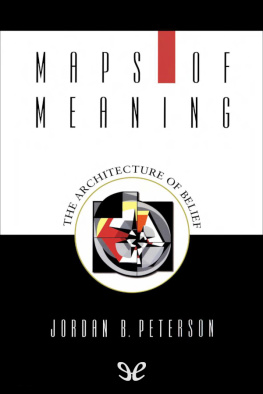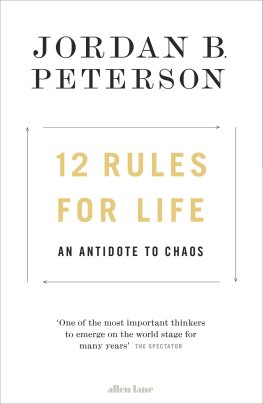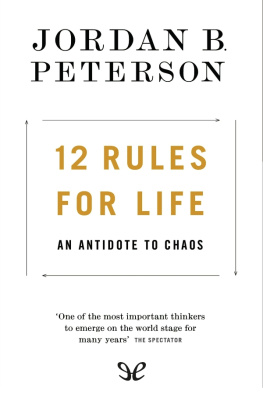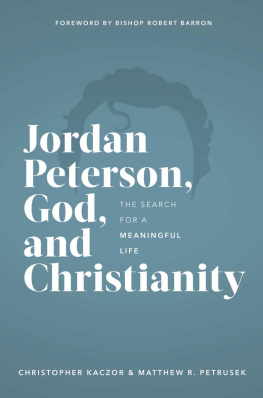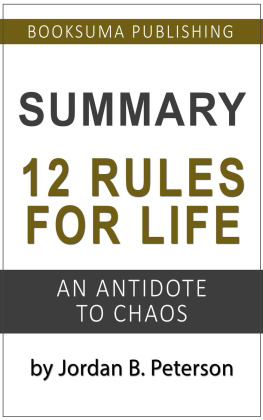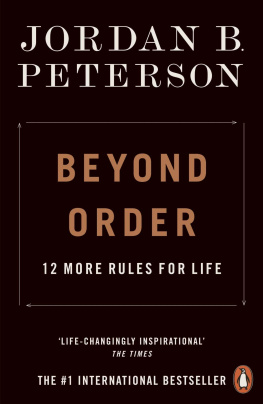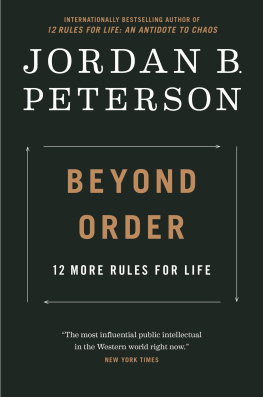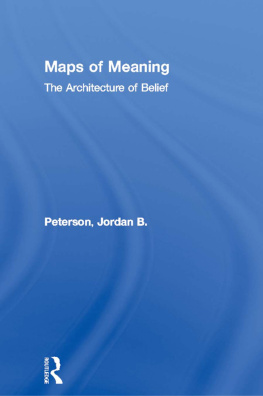Jordan Peterson - Maps of Meaning
Here you can read online Jordan Peterson - Maps of Meaning full text of the book (entire story) in english for free. Download pdf and epub, get meaning, cover and reviews about this ebook. year: 1999, publisher: ePubLibre, genre: Romance novel. Description of the work, (preface) as well as reviews are available. Best literature library LitArk.com created for fans of good reading and offers a wide selection of genres:
Romance novel
Science fiction
Adventure
Detective
Science
History
Home and family
Prose
Art
Politics
Computer
Non-fiction
Religion
Business
Children
Humor
Choose a favorite category and find really read worthwhile books. Enjoy immersion in the world of imagination, feel the emotions of the characters or learn something new for yourself, make an fascinating discovery.
- Book:Maps of Meaning
- Author:
- Publisher:ePubLibre
- Genre:
- Year:1999
- Rating:4 / 5
- Favourites:Add to favourites
- Your mark:
- 80
- 1
- 2
- 3
- 4
- 5
Maps of Meaning: summary, description and annotation
We offer to read an annotation, description, summary or preface (depends on what the author of the book "Maps of Meaning" wrote himself). If you haven't found the necessary information about the book — write in the comments, we will try to find it.
Maps of Meaning — read online for free the complete book (whole text) full work
Below is the text of the book, divided by pages. System saving the place of the last page read, allows you to conveniently read the book "Maps of Meaning" online for free, without having to search again every time where you left off. Put a bookmark, and you can go to the page where you finished reading at any time.
Font size:
Interval:
Bookmark:

Jordan Bernt Peterson (Edmonton, 1962) is a Canadian clinical psychologist, cultural critic, and professor of psychology at the University of Toronto. His main areas of study are the psychology of religious and ideological belief, and the assessment and improvement of personality and performance.
From 1993 to 1997, Peterson lived in Arlington, Massachusetts, while teaching and conducting research at Harvard University as an assistant and an associate professor in the psychology department. During his time at Harvard, he studied aggression arising from drug and alcohol abuse, and supervised a number of unconventional thesis proposals. Afterwards, he returned to Canada and took up a post as a professor at the University of Toronto.
In 1999, Peterson published Maps of Meaning: The Architecture of Belief. The book, which took him 13 years to complete, describes a comprehensive theory for how we construct meaning, represented by the mythical process of the exploratory hero, and provides an interpretation of religious and mythical models of reality presented in a way that is compatible with modern scientific understanding of how the brain works. It synthesizes ideas drawn from narratives in mythology, religion, literature and philosophy, as well as research from neuropsychology, in the classic, old-fashioned tradition of social science.
Peterson's primary goal was to examine why individuals, not simply groups, engage in social conflict, and to model the path individuals take that results in atrocities like the Gulag, the Auschwitz concentration camp and the Rwandan genocide. Peterson considers himself a pragmatist, and uses science and neuropsychology to examine and learn from the belief systems of the past and vice versa, but his theory is primarily phenomenological. In the book, he explores the origins of evil, and also posits that an analysis of the world's religious ideas might allow us to describe our essential morality and eventually develop a universal system of morality.
We tell ourselves stories about who we are, where we would like to be, and how we are going to get there. These stories regulate our emotions, by determining the significance of all the things we encounter and all the events we experience. We regard things that get us on our way as positive, things that impede our progress as negative, and things that do neither as irrelevant. Most things are irrelevantand that is a good thing, as we have limited attentional resources.
Inconveniences interfere with our plans. We do not like inconveniences, and will avoid dealing with them. Nonetheless, they occur commonlyso commonly, in fact, that they might be regarded as an integral, predictable, and constant feature of the human environment. We have adapted to this featurehave the intrinsic resources to cope with inconveniences. We benefit, become stronger, in doing so.
Ignored inconveniences accumulate, rather than disappear. When they accumulate in sufficient numbers, they produce a catastrophea self-induced catastrophe, to be sure, but one that may be indistinguishable from an act of God. Inconveniences interfere with the integrity of our plansso we tend to pretend that they are not there. Catastrophes, by contrast, interfere with the integrity of our whole stories, and massively dysregulate our emotions. By their nature, they are harder to ignorealthough that does not stop us from trying to do so.
Inconveniences are common; unfortunately, so are catastrophesself-induced and otherwise. We are adapted to catastrophes, like inconveniences, as constant environmental features. We can resolve catastrophe, just as we can cope with inconveniencealthough at higher cost. As a consequence of this adaptation, this capacity for resolution, catastrophe can rejuvenate. It can also destroy.
The more ignored inconveniences in a given catastrophe, the more likely it will destroy.
Enough has been learned in the last half-century of inquiry into intellectual and emotional function to enable the development of a provisional general theory of emotional regulation. Description of the role that reaction to novelty or anomaly plays in human information processing is clearly central to such a theory. A compelling body of evidence suggests that our affective, cognitive and behavioral responses to the unknown or unpredictable are hard-wired; suggests that these responses constitute inborn structural elements of the processes of consciousness itself. We attend, involuntarily, to those things that occur contrary to our predictionsthat occur despite our desires, as expressed in expectation. That involuntary attention comprises a large part of what we refer to when we say consciousness. Our initial attention constitutes the first step in the process by which we come to adjust our behavior and our interpretive schemas to the world of experienceassuming that we do so; constitutes as well the first step we take when we modify the world to make it what we desire, instead of what it is currently.
Modern investigation into the role of novelty in emotion and thought began with the RussiansE.N.Sokolov, O.Vinogradova, A.R.Luria (and, more recently, E.Goldberg) who adopted an approach to human function that is in many ways unique. Their tradition apparently stems from Pavlov, who viewed the reflex arc as a phenomenon of central importance, and from the Marxist intellectual legacy, which regarded workcreative actionas the defining feature of man. Whatever the specific historical precedents, it is most definitely the case that the Russians have regarded motor output and its abstract equivalents as the critically relevant aspect of human existence. This intellectual position distinguished them, historically, from their Western counterparts, who tend(ed) to view the brain as an information-processing machine, akin to the computer. Psychologists in the West have concentrated their energies on determining how the brain determines what is out there, so to speak, from the objective viewpoint. The Russians, by contrast, have devoted themselves to the role of the brain in governing behavior, and in generating the affects or emotions associated with that behavior. Modern animal experimentalistsmost notably Jeffrey Grayhave adopted the Russian line, with striking success. We now know, at least in broad outline, how we respond to those (annoying, irritating, frightening, promising) things that we do not expect.
The pioneering Russian psychophysiologist E.N.Sokolov began work on the reflex basis of attention in the 1950s. By the early '60s, this work had advanced to the point where he could formulate the following key propositions. First:
One possible approach to analyzing the process of reflection is to consider the nervous system as a mechanism which models the external world by specific changes that occur in its internal structure. In this sense a distinct set of changes in the nervous system is isomorphic with the external agent that it reflects and resembles. As an internal model that develops in the nervous system in response to the effect of agents in the environment, the image performs the vital function of modifying the nature of behavior, allowing the organism to predict events and actively adjust to its environment.
And second:
My first encounter with phenomena which indicated that the higher divisions of the central nervous system form models of external agents involved the study of reactions to novel [stimulus features. I characterized these reactions as] orienting reflexes. The peculiar feature of the orienting reflex is that after several applications of the same stimulus (generally five to fifteen) the response disappears (or, as the general expression goes, is extinguished). However, the slightest possible change in the stimulus is sufficient to awaken the response Research on the orienting reflex indicates that it does not occur as a direct result of incoming excitation; rather, it is produced by signals of discrepancy which develop when afferent [that is,
Font size:
Interval:
Bookmark:
Similar books «Maps of Meaning»
Look at similar books to Maps of Meaning. We have selected literature similar in name and meaning in the hope of providing readers with more options to find new, interesting, not yet read works.
Discussion, reviews of the book Maps of Meaning and just readers' own opinions. Leave your comments, write what you think about the work, its meaning or the main characters. Specify what exactly you liked and what you didn't like, and why you think so.

